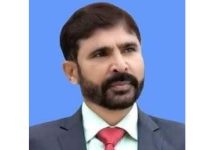Askari Raza Malik
Humans have always needed supernatural powers to protect them from man-made and natural disasters. This psychological phenomenon of fear and greed gave birth to mythologies. The Greeks had Zeus, the king of Olympus; Poseidon, the earth-shaker; and Ares, the god of war. They had Aphrodite, the god of Love, to cater for human lust.
The Romans had the king of all gods, Jupiter, and Mars as the god of war. Most possessed their female counterparts, goddesses, and sometimes their sister cum wives.
In Hindu mythology, the deities include Brahma, the creator, and Shiva, the destroyer and their consorts. Shiva’s power to fertilize barren women, expressed in his magnified Phallus symbol, is the sole attraction of many temples. Chiti Ghati near Abbottabad is an interesting example.
All these gods reflected Nature’s positive and negative forces. Some gods were benign, some unjust. Coleridge alludes to gods’ tyranny, ‘the gods drinking their nectar and laughing at the miseries of human beings.’
In Abrahamic religions, God is one, omnipotent, omnipresent and omniscience. He is exceptionally kind and all-forgiving. In Christianity, humans are His children. Satan is evil but operates within limits. He cannot lead the pious stray.
Then there are human gods: Nimrud, Pharoah, and Shaddad. Pakistan has had its fair share of human gods: Ghulam Muhammad, Ayub Khan, Bhutto, Zia, and Musharraf. Then came the whole dynasties of gods, Sharifs and Zardaris, who still plague the social and politico-economic landscape. God has just rid Pakistan of the evilest and most cursed chief judge. Hopefully, he was the last. Pakistan cannot afford another god of his ilk.
Any aspirant to be a future god must browse the pages of history. At the cost of repetition, I remember Liddle Hart, who said, ‘History might not teach us what to do in a given crisis, but it does tell us what not to do’ or words to that effect. In 1971, we lost erstwhile East Pakistan due to stubborn Bhutto’s doctrine, ‘Power at all cost,’ including Pakistan itself. He had openly said, ‘You keep your part, and we keep ours.’ He had not opened a single party office in East Pakistan. Mujib and Bhutto kept playing fool with Yahya Khan, a willing victim of his ambition and alcoholic stupor. Bhutto ensured that the Eastern part was lost to grab power in the West, which he did. And lo and behold, the whole blame fell on the shoulders of a stupefied Yahaya Khan. He was disgraced out of office, and a white paper was issued so that his entire clan would be ashamed of Yahya Khan for generations to come. Bhutto paid for his sins and was hanged. That is a lesson of history, ‘do not nurture illegitimate ambitions as God’s hand cannot be stopped from implementing His principles in life.’
Hijaj bin Yousaf, the Umayyad governor, was another tyrant of this dynasty. His oppression knew no bounds. But when the unseen and silent hand of destiny moved, he had to see his nephew and son-in-law, Muhammad bin Qasim, mercilessly murdered. He believed that God, in His unlimited bounty, would forgive him on the day of judgment. A student of history could not be sure. But before dying, he suffered from stomach cancer, an infliction that had no relief at the time. He died in agony. This is another lesson for those who continue scheming to extend the ongoing torture of their victims to allow them no relief. This is where history comes in. It tells us not to repeat the sins of Yahya Khan and Hijaj bin Yousaf.
Ayub Khan tried to defame the unblemished character of Miss Fatima Jinnah, the sister of the nation’s founder. His exit from power and life are examples of fear.
A chest-beating, power-drunk Musharraf had claimed an end to the politics of Bhuttos and Sharifs. He had to chew his own words and work with them. The lesson to learn is, ‘A mortal is too weak and vulnerable to shape destiny.’
The new Chief Justice belongs to an illustrious KPK family. His father, Omar Afridi, was from the 9th PMA long course. He earned the most coveted awards: the Sword of Honor for best all-around performance and the Norman Gold Medal, awarded to the best student, a rare honor. He joined 5th Horse (Probyn’s Horse). Later, he was assigned to the civil service, where he became the Chief Secretary and later a caretaker Chief Minister of KPK.
Yahya Afridi is a well-educated (Atchison College) and equally well-groomed individual. He is a bar at law from London. Before joining the Peshawar High Court, he was known to be a fair and large-hearted individual. His concern for human freedom motivated him to fight for every NAB victim during Musharraf’s days. But if he is anti-establishment, as most educated people of KP are, one cannot say. Exposure at the Federal level should have mellowed him down.
Still, he must carry the burden of his family reputation and his sense of Pashtun honor. Whatever he might do, he will never succumb to the complete slavery of the evil Zardari-Sharif coalition or Prince Bilawal’s and Princess Mariam Safdar and her foul mouth maids’ childish idiosyncrasies. All that Yahya Afridi has accomplished so far has earned him instant applause from a justice-starved public. Some skeptics interpret these as mere optics. It is hard to believe that he has already tied a Faustian knot with the devil.
From the other side of the hill, the story of the oppressed is summed up by Pauli Murray;
Now you are strong
And we are but grapes aching with ripeness
Crush us!
Squeeze from us the brave life,
Contained in this full skin.
But ours is a subtle strategy
Potent with centuries of yearning,
Of being Kegged and shut away
In dark, forgotten places.
We shall endure to steal your senses
In the lonely twilight of your winter’s grief.’
My duty was to caution — Al Balagh.
(The authored served Pakistan Army as Major General)

















